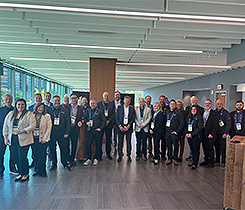Propane-fueled partnership
Scott Marine has lived his entire life in the shadows of the Great Smoky Mountains. Born and raised in Gatlinburg, Tenn., the 55-year-old has been surrounded by nature’s beauty and abundance.
 Scott Marine is the transit director for Pigeon Forge’s Fun Time Trolley. |
But over the years, Marine has sensed a difference in his surroundings living in eastern Tennessee. The air quality has declined, and the range of visibility has lessened, says the transit director for Pigeon Forge’s Fun Time Trolley.
“I have seen black and white photos from locations here in the park that appeared to have much more visibility than they do today,” Marine says.
The three cities in Sevier County, Tenn., that front the Smoky Mountains – Gatlinburg, Pigeon Forge and Sevierville – are bustling with tourists covering miles of attractions. Roads are lined with cars.
The U.S. Environmental Protection Agency has backed Marine’s claims, designating Sevier County a non-attainment area. This means the area hasn’t met federal clean-air standards to protect public health.
In addition, a 2004 report by the National Parks Conservation Association shows ground level ozone, acid rain and air pollution are severely affecting Smoky Mountains National Park. Air pollution has lessened the average range of visibility in prime locations from 113 miles to 25, the report shows.
“There’s been discussion about where that comes from,” says Steve Hendrix, assistant city administrator for Sevierville, on the region’s poor air quality. “A lot of weather comes this direction, and the mountains do provide a barrier.
 Pigeon Forge operates Sevierville’s 12 trolleys that run on propane. Eight are propane/electric hybrid buses and four dedicated propane. |
“We need to improve on air-quality issues and be more sensitive to it because we are next to a national park.”
Joint venture
These concerns, combined with Sevierville’s desire to establish its own transit system, led to a Sevierville-Pigeon Forge partnership based on propane.
“Sevierville has grown tremendously over the last few years, and the subject came up for a trolley system in Sevierville, much like Pigeon Forge and Gatlinburg have,” Marine says.
Since 2005, Sevierville has added 12 propane trolleys – eight propane/electric hybrids and four dedicated propane – to Pigeon Forge’s fleet. The Fun Time Trolley Service, which started in 1986, now operates more than 30 vehicles in Pigeon Forge, parts of Sevierville and outside Gatlinburg.
“The state asked us to partner with Pigeon Forge, mainly because we saw a need for the system,” says Bryon Fortner, Sevierville’s public works director.
Pigeon Forge connects Sevierville to the south. The trolley service already had been running north, close to the border. Extending the route into Sevierville made sense, and it fulfilled requests from riders who wanted to visit Tanger Outlet Center at Five Oaks.
 The propane/electric hybrid trolleys are made by Ebus Inc. and use a propane-fueled Capstone Turbine auxiliary power unit, shown above to the left. |
“We’ve been very fortunate,” says Hendrix, who oversees Sevierville’s transit system. “Since we weren’t in the transit business before, we could get into clean-fuel technology without having to retool, rehire or divide resources. You can’t underestimate the backbone of the Pigeon Forge system that has allowed us to move in this direction.”
Sevierville officials spent much time and effort putting its funding package in place. The 12 trolleys totaled $2.5 million with help from state and federal funding. Each new trolley now costs about $350,000.
Handling the hybrids
Sevierville makes the capital investments in the trolleys and contracts with Pigeon Forge for operations. Maintenance is split between the cities, with Sevierville servicing the eight hybrids and Pigeon Forge the four dedicated propane trolleys.
The eight hybrids are manufactured by Ebus Inc. in Downey, Calif. These trolleys use a propane-fueled Capstone Turbine auxiliary power unit (APU), which acts as a generator. The APU generates the power that charges the battery packs.
“Propane is cleaner burning, gives off less emissions and less carbon content,” says Jim Dennison, fleet manager for Sevierville. “The cleanliness is amazing for us.”
Dennison, who was hired five years ago, is amazed by the turbine system’s simple maintenance. He was trained on the trolleys by Ebus and certified by Capstone on the turbine generators. He handles any issues with an assistant at the Sevierville garage.
And the issues are minimal. Cold weather affects the hybrids, but Dennison says the trouble is not related to propane.
 A monitor in the Fun Time Trolley Service office in Pigeon Forge shows the location of buses along their routes throughout the city. |
“Propane is not the problem,” he adds. “The problem is with the hybrid system on the buses.”
Otherwise, the hybrids, which hold about 30 passengers, have drawn positive reviews for their smoothness and quiet operation. One driver says the trolleys, due to their low noise, often sneak up on people waiting to ride.
“Customers notice the hybrids more than the regular propane buses,” Marine says. “There are a lot of comments on the hybrids because they are so much quieter inside.”
Dedicated systems
The four trolleys equipped with dedicated propane Cummins engines are manufactured by Dupont Industries Inc. in Quebec, Canada. They each hold about 35 passengers.
Pigeon Forge overcame some early glitches with the trolleys, which Marine says were not necessarily attributed to the fuel, and only a few trouble spots remain.
“We noticed with the four propane vehicles that the engines tend to give off a lot of heat,” says Marine, noting the drivers’ leg rest is positioned on the engine box. “The drivers have had some complaints about that.
“The LP engines are up front – they don’t offer rear engines for propane,” Marine adds. “Mechanics would prefer that rear access for maintenance, and it keeps the heat and noise in the rear.”
Marine and Ernie Lemmond, operations supervisor for Pigeon Forge and a former Suburban Propane employee, also say the trolleys sometimes have a problem with surging and skipping during acceleration.
“I know that propane should be run without any problems because we didn’t have any problems running our whole fleet on propane [at Suburban],” Lemmond says.
Incorporating propane trolleys into his fleet has been challenging at times, Marine admits. The fueling process adds time, effort and labor, and garage safety involves extra care.
“These big transit vehicles are known for putting out a lot of exhaust and emissions, and we realize there are more sacrifices on the front end [to operate clean-fuel vehicles],” Marine says. “The end result is worth it because we’re doing something good for our kids and grandkids.”
Fueling up
Pigeon Forge refuels all 12 propane trolleys with two 1,000-gallon tanks that AmeriGas supplies. Marine says with tax incentives the city pays about $1.85 per gallon.
The hybrid trolleys have 60-gallon propane tank capacities, while the dedicated propane trolleys have tanks with capacities pushing 200 gallons. Last fiscal year, the 12 trolleys burned about 53,000 gallons of propane, with July being the busiest month with about 7,500 gallons, Pigeon Forge reports.
Most of the remaining vehicles in the fleet are fueled by diesel, and Pigeon Forge is converting them to a biodiesel blend, Marine says.
With Smoky Mountains National Park the most visited of any national park in the country, attracting 8 to 10 million people per year, the surrounding cities will have no shortage of passengers. Trolley season runs from March through December, and Pigeon Forge reports about 700,000 passengers paid the 50 cents to ride last year.
Sevierville officials say they are planning additions to their trolley fleet in the next six months but are still considering their options. They maintain a commitment to clean-fuel technology.
“The bottom line is it’s the right thing to do,” Hendrix says. “We simply can’t continue to depend on conventional technology that pollutes our environment.”
















